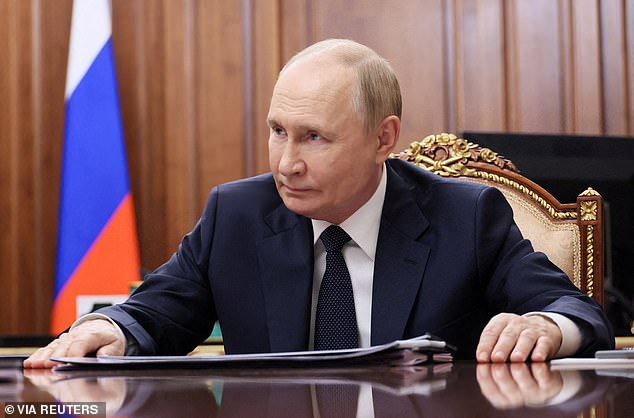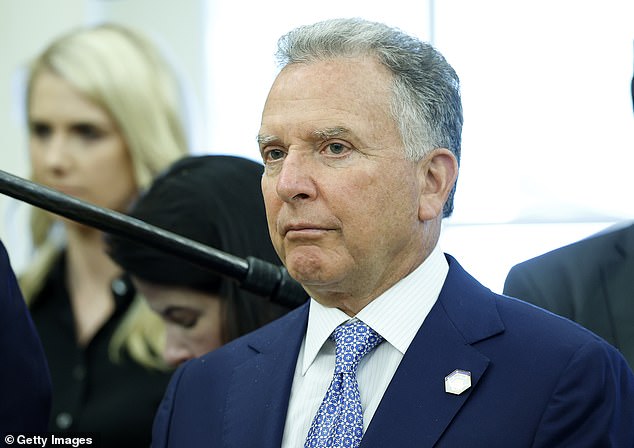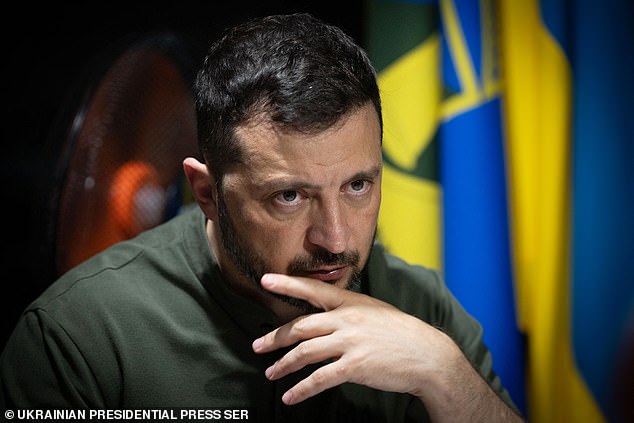By BY MARK NICOL DIPLOMACY EDITOR
Published: | Updated:
Russia is considering ending its aerial bombardment of Ukraine to avoid US trade sanctions on Friday, according to reports.
The Kremlin would continue waging the conflict but would desist from rocket attacks on Ukraine’s cities which serve no military purpose.
This would be the first concession granted by Russia since the conflict began three and a half years ago, it if transpires.
The Russian plot was reported by Bloomberg last night as US peace envoy Steve Witkoff was expected to travel to Moscow for talks.
He is expected to hold urgent discussions with senior Kremlin officials today [Wednesday] in a bid to bring Russia to the negotiating table.
Russia could face economic sanctions from Friday, affecting itself and trading partners such as China and India, unless Vladimir Putin agrees to talks.
President Trump initially gave President Putin 50 days to strike a peace deal then cut the time to ’10 to 12 days’.
Ahead of the deadline, Russia has pulled out of a nuclear missile agreement intended to limit numbers of short to medium range missiles in Europe.


Witkoff has been criticised for the tone of his previous visits to Russia. At times he has appeared fawning in Putin’s presence and has failed to secure any concessions.
After one meeting earlier this year, Putin presented Witkoff with a portrait of President Trump to take back to the White House.
Yesterday afternoon [Tues], Ukraine’s President Volodymyr Zelensky confirmed on social media he has spoken President Trump. But he did not mention the deadline.
President Zelensky described their conversation as ‘productive’ with the ‘key focus of course being ending the war’.
He added Ukraine and the United States have ‘coordinated our positions’ while the Russians have ‘intensified the brutality of their attacks’.
President Trump’s plan is to hit Russia with ‘secondary tariffs’ in a bid to end the war.
These will punish states that purchase Russian energy supplies, making it more expensive for these countries to sell goods into the United States.
As a major importer of Russian oil, India is particularly vulnerable. Its government has protested the unfairness of the strategy, claiming India’s critics also import Russian goods.
Trump has accused of India of ‘fuelling [Russia’s] war machine’. India has called the 100 per cent secondary tariffs ‘unjustified and unreasonable’.
Ukraine claimed earlier this week that it has found Indian-made components inside Russian attack drones fired at its cities.

Indian Prime Minister Narendra Modi is also said to be personally close to Putin. They appear to share a warm relationship and are economic allies.
Putin is widely expected to ignore Trump’s deadline. While the US President has repeatedly excused Putin’s failure to agree peace terms.
But with President Trump under pressure in the US over his connections to sex trafficker Jeffrey Epstein, he may adopt a tougher stance towards Putin.
President Trump signalled his intent last week by publicly stating he had repositioned a pair of US nuclear submarines closer to Russia to keep the Kremlin in check.
Russia responded strongly declaring it was pulling out of a nuclear missile agreement due to ‘destabilising actions’ by Western powers.
So far, the Kremlin’s only step towards peace has been a pledge by Putin’s spokesperson Dmitry Peskov that the Russian President will meet President Zelensky.
But the offer was subject to caveats around Russia’s demands for a negotiated end to the conflict.
Witkoff is expected to outline economic sanctions the US is likely to impose on Russia.
Peskov has said the Kremlin considers its contacts with US Special Envoy Witkoff ‘important and useful’.








